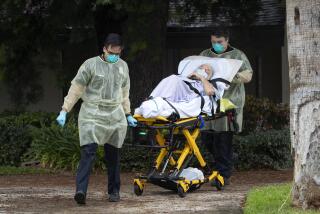2 Investigations Set on Overcrowding of Emergency Room : Health: State will inspect conditions at County-USC. L.A. County orders its own study of options for speeding patient care.
- Share via
State and county officials Tuesday pledged to investigate reports of dangerously overcrowded conditions in the emergency room at County-USC Medical Center.
Jacqueline A. Linzer, district administrator of the state Department of Health Services licensing and certification program, said that department inspectors will visit County-USC’s emergency room next week. “We are aware of the problem, and it will be reviewed,” she said.
In a related action, the Los Angeles County Board of Supervisors demanded an accounting from health services chief Robert Gates. Supervisor Gloria Molina accused Gates of withholding information about the problem until last week, when he sent supervisors a memo warning of a pending article in The Times.
“The memo was so sugar-coated that everything sounded A-OK,” charged Molina, whose supervisorial district includes the medical center. “It did not clue us in to the reality of what’s going on.”
In the meantime, Gates said that he has dispatched his top deputy, Carl Williams, to report daily to County-USC to assist officials there in drafting a plan to “identify options and price tags” that will relieve pressure on the medical center’s emergency department.
Williams held his first “brainstorming” session at the medical center late Tuesday, meeting with hospital and county health administrators, doctors, and a county attorney. Gates also was present.
Among options they considered are expanding hours at county health centers, contracting with private hospitals for the care of some patients and diverting ambulances to other hospitals when County-USC’s emergency room is full.
Williams said he also discussed restricting emergency room access for foreigners and residents of other counties when their medical problems do not require immediate attention.
Supervisor Michael Antonovich earlier had complained of “illegal immigrants” consuming medical resources “at the expense of people already here and paying taxes.”
Emergency room doctors have complained for several months about overcrowding that they say has forced them to ration health care and has resulted in several patient deaths.
More than 500 patients a day--at least 100 of whom are in serious condition--seek care in the hospital’s main emergency room, which has 18 beds and 23 examining booths. The medical complex, made up of four hospitals, has a total of 1,398 beds--about 10% fewer than a decade ago.
In September, Dr. Edward Newton, a supervising physician in the emergency room, notified hospital officials that patients commonly linger in the emergency room 24 hours or more before being assigned a bed. He said that several patients have died because operating rooms were full and doctors have been forced to prematurely remove patents from ventilators. “We are being required to ration health care and at times to perform what amounts to passive euthanasia,” Newton wrote to his superiors.
Top county officials acknowledged in interviews the accuracy of Newton’s charges, but Gates said Tuesday he is “skeptical” that overcrowding has forced doctors to ration health care.
However, he concurred that patients are waiting longer and that more patients than ever are seeking care at county emergency rooms.
Gates said the county health care system has not been able to expand to keep up with the increasing demand for services. “Each year, we’ve had major difficulties in just funding present operations without adding new staff and new resources,” he said.
Supervisor Ed Edelman suggested that health officials study whether private hospitals are fulfilling their “legal and moral obligation” to provide charity care for the poor and the medically uninsured.
And Supervisor Deane Dana told Gates that in the future, he should write memos to the supervisors alerting them to health care problems, so that they are not surprised by “reading it in the paper.”
More to Read
Sign up for Essential California
The most important California stories and recommendations in your inbox every morning.
You may occasionally receive promotional content from the Los Angeles Times.










